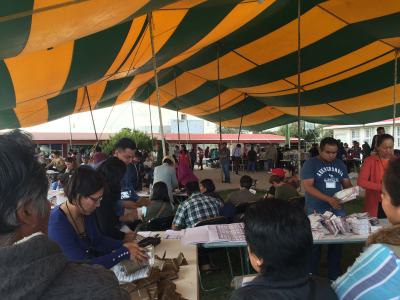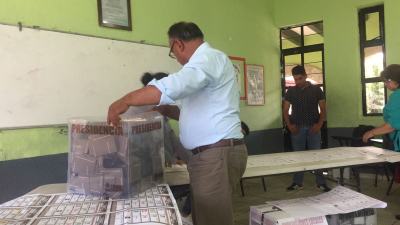July 01, 2018
Welcome to our live blog of Mexico’s historic elections today. See our introductory post here.
All update times are Eastern time zone.
UPDATE 11:12 PM: FEPADE provided an updated tally on electoral complaints received throughout the day. Throughout the country there were 394 complaints at the federal level, and even more concerning local races. 19 people were arrested for federal electoral crimes.
UPDATE 11:08 PM: And now President Donald Trump has tweeted his congratulations to president-elect Obrador.
Congratulations to Andres Manuel Lopez Obrador on becoming the next President of Mexico. I look very much forward to working with him. There is much to be done that will benefit both the United States and Mexico!
— Donald J. Trump (@realDonaldTrump) July 1, 2018
UPDATE 11:01 PM: Mitofsky has now released its Senate exit polls, which indicate a possible majority for Morena and allies with 56-70 seats. There are 128 seats in the senate.
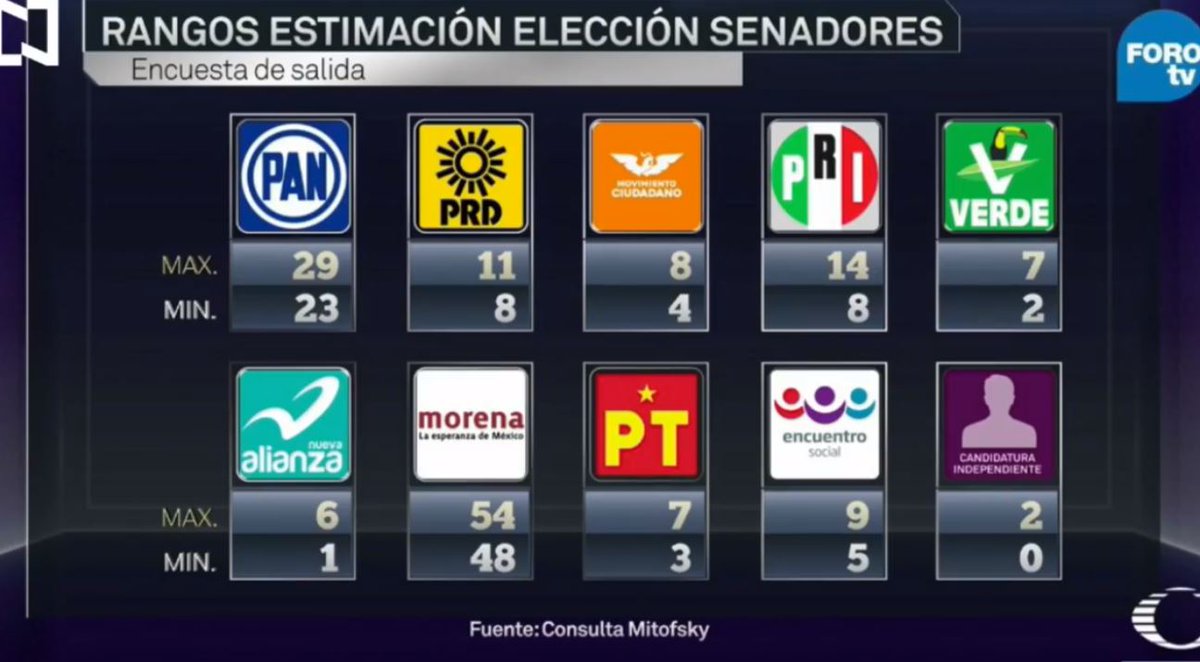
UPDATE 10:36 PM: U.S. Congressional Progressive Caucus co-chairs, Rep. Raul Grijalva and Rep. Mark Pocan, have released a statement following Obrador’s likely victory.
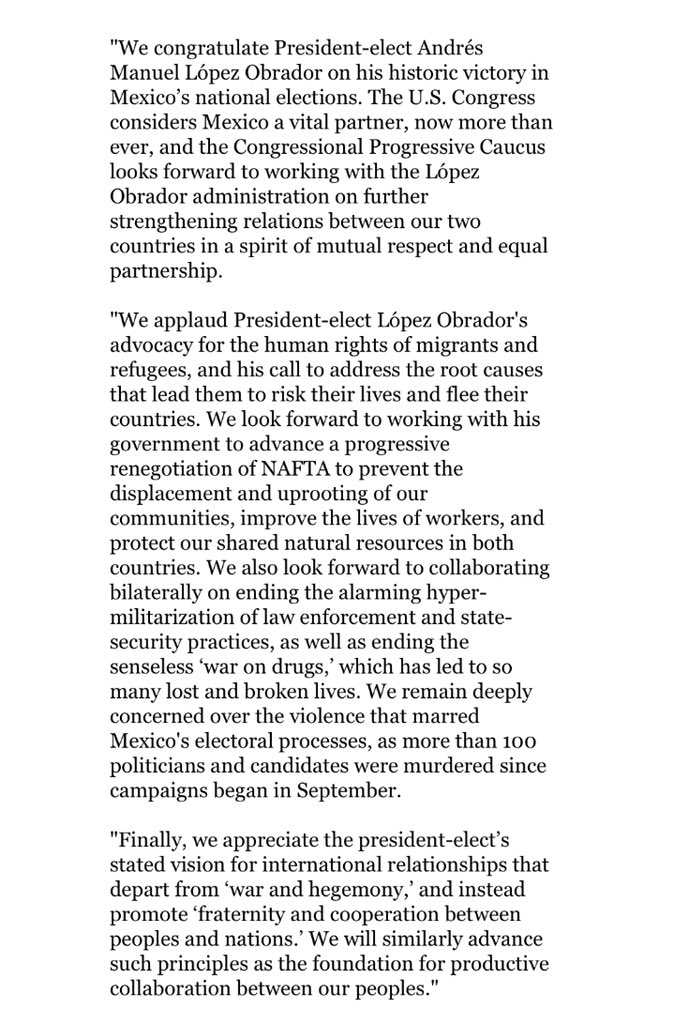
UPDATE 10:27 PM: Pollster Mitofsky has just released exit poll data estimating Moreno and it’s allies in “Together We Will Make History” winning between 256 and 291 seats – a majority. 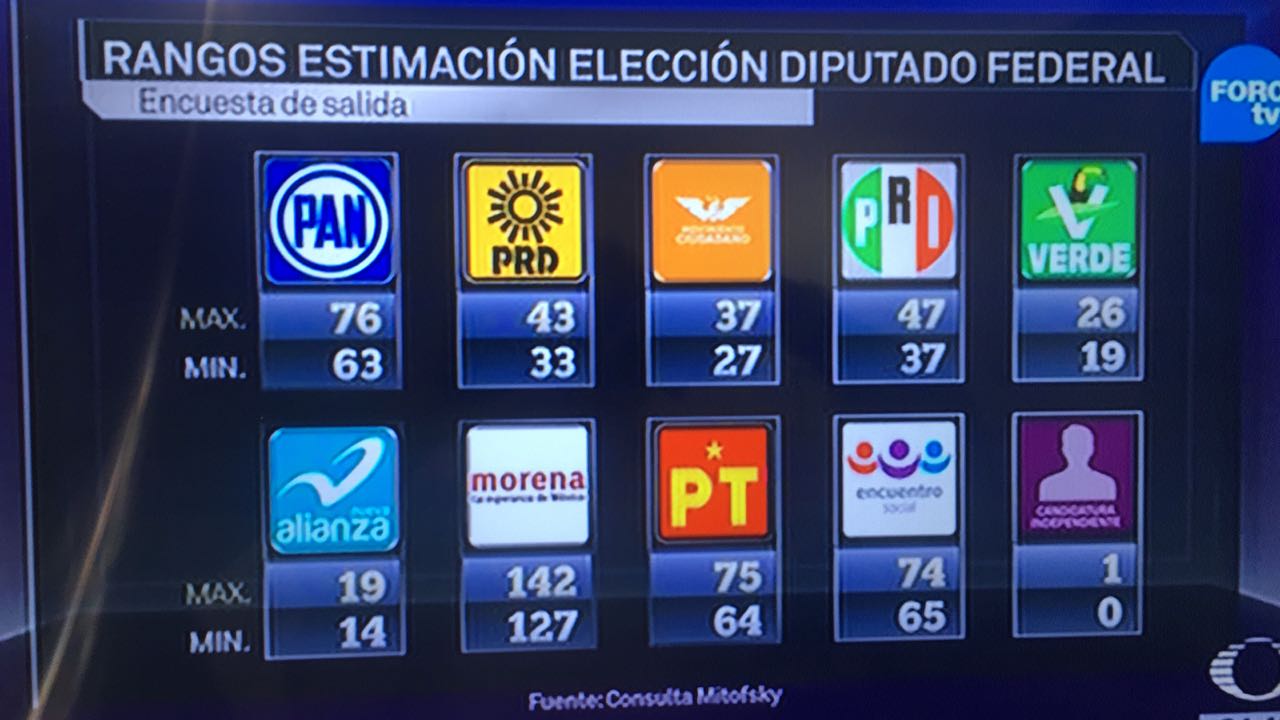
UPDATE 10:12 PM: Argentina issued a statement congratulating Obrador on his election victory. Again, official results are based on only 0.32 percent of total ballots, but as Richard Ensor of The Economist points out, these early returns indicate a broad-based victory for Obrador:
24 states have started counting votes. Meade is winning in San Luís Potosí. Anaya is winning in Guanajuato and Aguascalientes. AMLO is winning in the other 21.
— Richard Ensor (@richardjensor) July 1, 2018
UPDATE 9:45 PM: Official results have just started being posted by INE, but the results appear irreversible. Ricardo Anaya of the PAN has also just conceded defeat to López Obrador.
UPDATE 9:31 PM: More exit polls are giving AMLO around 50 percent of the vote. ADN has AMLO with 51 percent to Anaya’s 23 percent, with Meade again at 18 percent. The Washington Post is reporting: “Several exit polls gave Lopez Obrador a double-digit lead over his two closest competitors….”
UPDATE 9:18 PM: El Financiero is also projecting Morena with 38 percent of the vote for the chamber of deputies (the legislative lower house), the PAN with 22 percent, the PRI with 18 percent, the PRD with 6 percent, and the PT (Workers’ Party) with 4 percent.
UPDATE 9:16 PM: The ruling PRI’s presidential candidate, Jose Antonio Meade, has conceded defeat to Obrador before official results are announced.
UPDATE 9:11 PM: El Financiero’s presidential exit poll has been released and it shows Morenas’ Obrador with 49 percent of the vote. Anaya of the PAN is in second with 29 percent, and the PRI’s Meade is in third with 18 percent, according to the poll.
UPDATE 8:52 PM: The 5:00 pm report from Diálogos por la Democracia is now available. They say they “received and tracked and directed” 198 citizen complaints, of which 52 were for “soliciting votes for payment, promises of money, or other consideration.”
UPDATE 8:43 PM: An observer in Tlaxcala reported at 8:20 pm:
[They’re conducting the count for] President and diputado at the same time here In Tlaxcala. All mesas/casillas can decide if they are going to take additional security measures. At this casilla, they signed (have to confirm how many / who) as an extra security measure. Most we visited today were not signing. In another area of Tlaxcala they had stolen some ballots previous to the election. In addition to reprinting, they required signatures (2 mesa, 2 partidos) on every ballot. Wind in a tent is complicating working with lots of paper ballots…
UPDATE 8:37 PM: In a series of tweets (ongoing), the #Verificado2018 project reported the confirmed cases of electoral violence and irregularities in Puebla state today. A PRI activist was killed in the municipality of Acolihuia. At the Emiliano Zapata school in Barranca Honda, 8-10 gunmen showed up at around 2 PM and fire off shots, temporarily closing the center. At a voting center in Colonia Fuentes de San Aparicio shots were fired and ballots for president and governor were stolen. Ballots were also stolen in San Sebastián by seven armed individuals.
UPDATE 8:28 PM: An observer in Jilotepec reports:
Here in Section 2260 in Jilotepec, the counting of blank ballots is finished and now a poll worker is reading out the number of registered voters that have voted on each page of the thick voter registry for casilla contigua 3 while all of the party representatives confirm that his count matches their count, page by page. In a few places there are discrepancies which they resolve. In total, 459 of 650 registered voters deposited ballots in the urns of this casilla.
With that done, on to the tallying, starting with the ballots for the presidential election. They are all dumped on a table by the president of the casilla, and the poll workers begin to unfold each ballot. Another long process. [They’re tallying the municipal ballots and the presidential ballots at the same time.]
UPDATE 8:20 PM: At 8:06 pm, observers reported that rain did indeed begin to pour at casilla 0734 in Coyoacán, “forcing a hurried move inside an auditorium next to the casilla.”
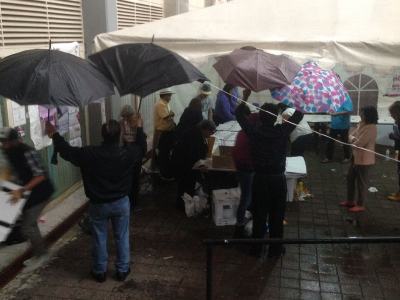
UPDATE 8:16 PM: Exit polls being reported by El Financiero project the next governor of Jalisco will be the Citizens Movement candidate Enrique Alfaro, and in Guanajuato the “Por Guanajuato al frente” candidate Diego Sinhué. The governor’s race in Yucatán is projected to be between the PAN and Citizens Movement candidate Mauricio Vila and the PRI-Green Party candidate Mauricio Sahuí. In Veracruz, the race is projected to be down to the “Together We Will Make History” candidate Cuitláhuac García and the “Por Veracruz al frente” candidate Miguel Ángel Yunes. In Puebla, the race is projected to be between Miguel Barbosa of the “Together We Will Make History” coalition, and the candidate of the “Por Puebla al frente,” Martha Erika Alonso.
UPDATE 7:59 PM: An observer reports: “Here at casilla 0734 [in Coyoacán], they are lining up on the ground to help organize the ballots. But there is no electric light. They are trying to run a cable to a nearby store. And it is about to start raining. Lining up sheets of paper. They have a tent, but the ballots are being organized on the ground and if it rains they may get wet.”
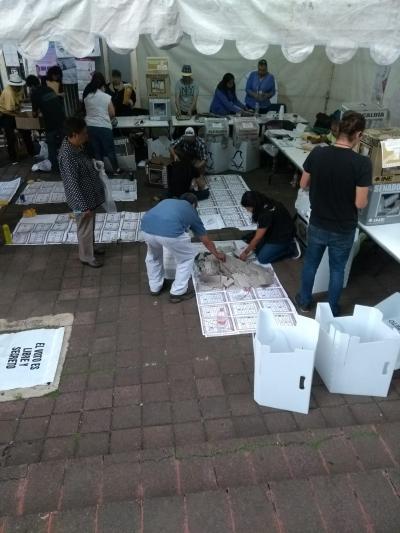
UPDATE 7:51 PM: At 7:42 pm, an observer at casilla Tlaxcala 453 reported: “They closed the gate at 6 (people in line within the fence could stay in line/vote) so people broke the fence to get in. Looks like police had it all under control, no further incident.”
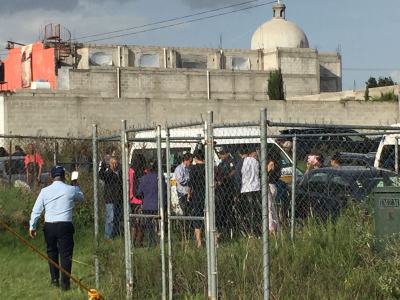
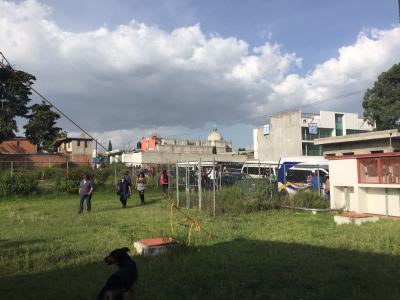
UPDATE 7:42 PM: El Financiero reports exit polls projecting candidates from the “Together We Will Make History” (Juntos Haremos Historia) Coalition (of which AMLO is the presidential candidate) winning the governors’ seats in Morelos, Tabasco, Chiapas, Puebla, and Veracruz [between two candidates in each] as well as Mexico City.
UPDATE 7:34 PM: More updates are coming in from the network of observers that have been out across the country today: “District 30 in Estado de México: no serious irregularities to report all along our route today, from Valle de Bravo to Tejupilco and back, 9 polling stations and about 30 casillas. High participation, roughly 70%, and calm atmosphere everywhere …Lots of dedicated citizens doing their best to make these elections happen in a peaceful and orderly manner. Polls just about to close back here in Valle de Bravo and the initial counting process will soon begin under a tent in a playground protecting us from heavy rain. Here there are four casillas bunched together in one small space but somehow it has worked.”
UPDATE 7:31 PM: An observer reports on the closing of polls in a different center in Jilotepec. “Here in casilla contigua 3 of section 2260 in Jilotepec they’ve just brought the five ballot boxes from outside into a classroom where the poll workers are setting things up and the party reps, two per party here, are sitting behind desks and waiting. There was a little drama a short while ago when two elderly women came to vote just as the president of the casilla declared the casilla closed. The late-comers were not allowed to vote. A younger woman was irate as she said that the women had arrived at the center several minutes before 6 and had had trouble identifying the casilla where they could vote.”
And, another update a few minutes later which adds more detail on the process at the close of the day: “The poll workers are now counting the blank ballots. Afterwards, the total of blank ballots and filled in ballots will be calculated with the expectation that it will match the total of blank ballots that the casilla was given. Once the blank ballots are counted the president of the casilla draws two lines through each blank ballot, making them null and void. Though the president is marking the ballots quickly it’s a slow process given that there five sets of at least a hundred blank ballots.”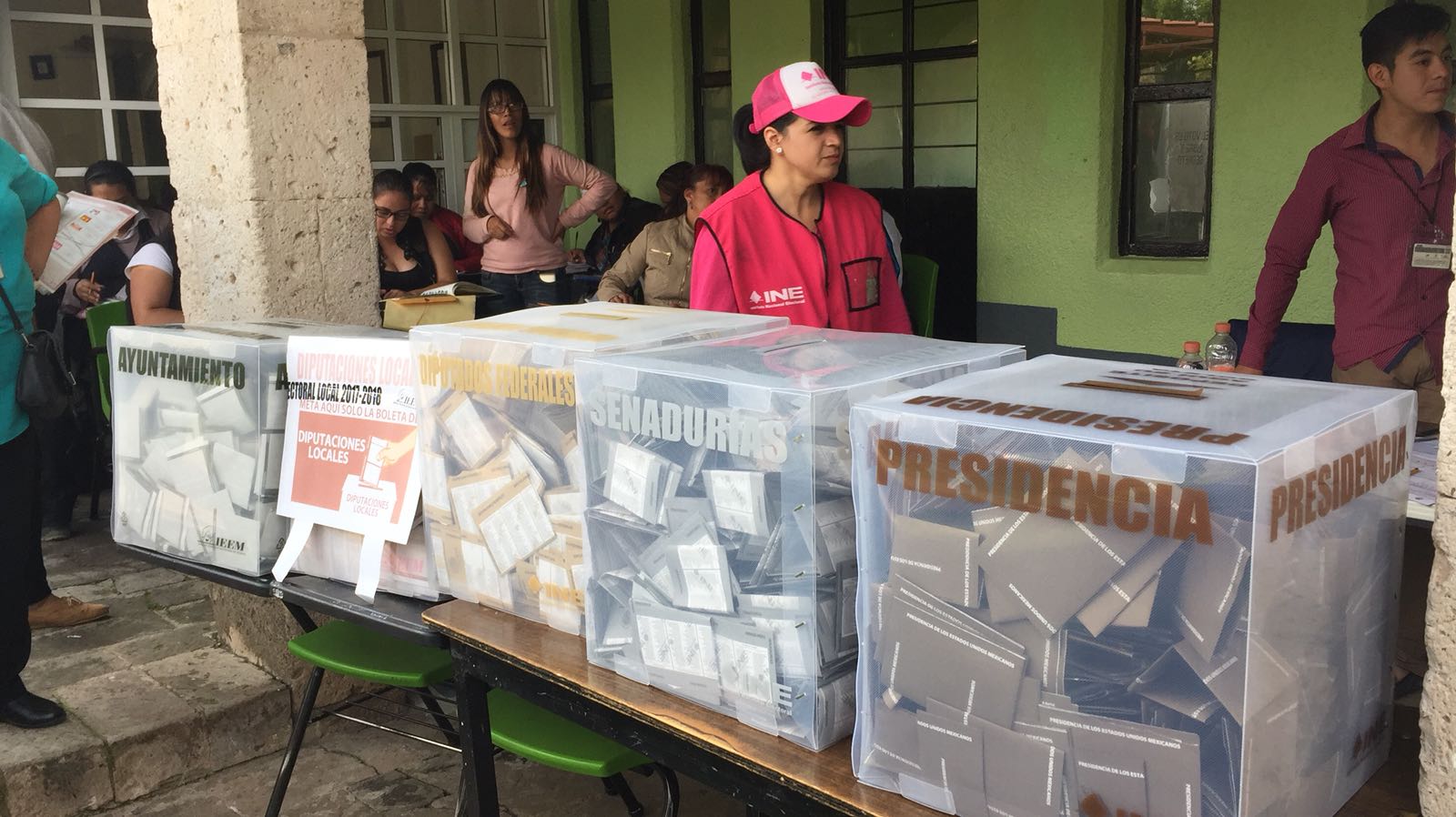
UPDATE 7:12: As a long election day comes to a close, a long night of counting begins. An observer reports: “We are now in the closing of a polling station in Jilotepec. In accordance with Mexican law, they have asked all but one representative of each party to leave. One person from each party will stay behind for the opening of the ballot boxes and the initial organization and counting of the ballots. Here in the Estado de México, there are five races, so five separate ballots, which all need to be opened and organized. This is just the first step in a long process of getting this count started.”
UPDATE 7:10 PM: Bloomberg’s and El Financiero are beginning to release exit poll data. Eric Martin writes for the Bloomberg live-blog:
We’re starting to get our first exit polls in, and El Financiero is projecting that Claudia Sheinbaum, the Morena candidate, will be the next mayor of Mexico City.
Sheinbaum’s win was widely expected, as she has been leading polls. Sheinbaum, a 55-year-old scientist, previously served as head of the Tlalpan neighborhood in southern Mexico City. Candidates from the left or left-led coalitions have controlled the mayor’s office in the capital since the 1990s.
Martin notes that governor races in Pueblo and Veracruz are “too close to call.”
UPDATE 7:06 PM: Update from an observer at 6:03 PM local time: “Casillas 0734 & 0732 in Coyoacán, all quiet. High turnout. 80% & 76.5%. At 6 PM noone was in line. The president declared the casilla closed. everyone applauded and some shouted ‘para democracia.'”
UPDATE 7:03 PM: As polling centers begin to close, INE has begun counting votes from Mexicans abroad. Journalist Jorge Ramos noted earlier that it was “shameful and a failure” that only 98,000 sent votes from abroad when there are more than 12 million Mexicans living outside the country. In a tweet, Ramos wrote: “It seems that the system is made so that we do not participate.”
UPDATE 6:58 PM: The #Verificado2018 project provides an update on reported violent conflicts impacting the vote in Veracruz. According to the local electoral office, casilla 0955 en Coatzintla was forced to close twice due to violence, but voting has continued. In Coatzacoalcos a shootout occured, but not, as had been reported, near a voting center.
UPDATE 6:46 PM: INE member Ciro Murayama notes that due to high levels of participation many voting centers may not be able to close at 6 PM (local time), which may delay the release of preliminary results (expected to begin around 8 PM). Meanwhile, Leonel Fernandez, the head of the OAS electoral observation mission has issued a statement noting that the election has so far transpired without major incidents, and has seen “massive participation.”
UPDATE 6:30 PM: There are images posted on Twitter, and media reports, of men burning ballots at casilla 0381 in the Escuela Primaria José María Morelos y Pavón in Chilcota, Michoacán.
UPDATE 6:24 PM: @Andalalucha has been Tweeting about the numbers of people waiting to vote at casillas especiales:
This is also happening in Playa de Carmen and all over the country. People place blame on those who want to vote instead of a government that didn’t predict that so many people, far from home, would want to participate in these elections and plan ahead. https://t.co/RgQDpg3B0H
— Andalalucha (@Andalalucha) July 1, 2018
Polling places close at 6:00 pm local time.
UPDATE 6:15 PM: T.M. Scruggs, an observer with the Scholars’ and Citizens’ Network for Democracy, reports:
All 9 casillas visited today in 4 towns and cities in the SW part of Mexico State have proceeded with tranquillity and appear organized and well run. No waiting longer than 20 minutes observed except at the Casilla Especial in Ixtapan de la Sal where the wait was at least an hour for the non-local residents.
The generalized late opening of voting booths appears to be related to the complexity of five ballots due the five levels of voting, from federal to municipal level. Even where the materials arrived on time the poll workers needed to arrive earlier than last year’s comparatively less complicated one. In SW Mexico State for example the ten casillas we have observed started setting up at 7:30 am when they really needed to begin at 7 am, the hour designated as such by the INE. All these casillas opened between 8:30 and 9:30 am [correction: 9:00 am] with exception of one that opened just after 9:30 am.
UPDATE 5:49 PM: MVS Noticias reports that observers from Central America are concerned by the lack of sufficient ballots at the casillas especiales, and plan to report to the INE about it.
El Economista also reports on the “chaos” in special polling places, where people have been waiting several hours to vote.
UPDATE 5:33 PM: An update on casilla Alvaro Obregón 3458 from a different observer: “When we arrived, dozens were milling outside, one woman in particular appeared to be floor manager, on the phone she openly talked about running electoral operation, when I approached she subsequently ducked into house in front of casilla, we approached INE official, claimed not to be aware; subsequently he came out and publicly admitted the PRD was fighting tooth and nail for this casilla, we have audio; after our complaint the area cleared out!”
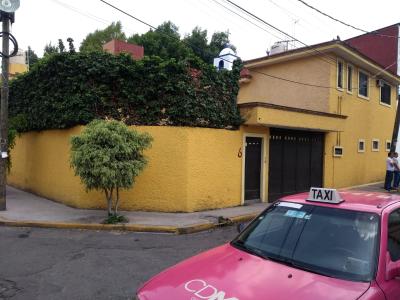
PRD house across the street from casilla Alvaro Obregón 3458.
UPDATE 5:19 PM: In Iztapalapa, some 583 ballots were stolen, according to the head of government in Mexico City, José Ramón Amieva (see 2:41 pm update, below). He added that there was no process for the replacement of ballots and so those individuals at Casille 2567 in Ampliación Santiago, will not be able to vote. Arnieva also noted the late opening at various polling centers this morning.
UPDATE 5:09 PM: FEPADE provides updated figures on electoral complaints. By 2 PM local time, there had been 1,106 denunciations of possible electoral crimes across the country, 640 at the community level and 466 at the federal level. The states with the highest number of complaints are Pueblo (127), CDMX (51), Mexico State (46), Chiapas (38), Oaxaca (27) and Veracruz (25). Seventeen individuals have been detained.
UPDATE 5:02 PM: Aristegui Noticias reports that a Labor Party activist, Flora Reséndiz González, was killed today when leaving her home in the community of Contepec in Michoacán state. In another report, the Michoacán electoral institute confirmed to Aristegui Noticias that it had cancelled elections in the indigenous community of Nahuatzen and has had to close some voting centers in other communities in the region following electoral violence and other irregularities.
UPDATE 4:53 PM: More from an observer at casilla 3458 Álvaro Obregón, CDMX: “The Morena representative told us and the INE representative that he had filed a complaint with FEPADE about the obvious vote buying by what he said was the PRD.” The observer noted that the house the PRD is operating from is located across the street from the voting center.
Since Thursday FEPADE, the electoral crimes authority, has received 534 complaints according to the agencies director, Héctor Días Santana. 460 of the complaints came before election day, while 74 were recorded by noon today.
UPDATE 4:30 PM: An observer reported at 3:17 pm ET: “250/534 have voted in Tchiautempan, Tlaxcala (section 133). Busy, tranquilo, organized. Things have been pretty calm in Tlaxcala (besides the 1 chaotic one we saw with halcones).”
Journalist James Fredrick reported that voters were waiting more than six hours to vote at the Hospital General, Del. Cuauhtemoc due to insufficient ballots:
Saw the same in Del. Cuauhtemoc, Hospital General. Voter waiting more than 6 hrs, some going to 3-4 special polling places trying to find one with ballots https://t.co/DZckMSIkmz
— James Fredrick (@jameslfredrick) July 1, 2018
Another observer reports: “At casilla 3458 Álvaro Obregón, CDMX, we spoke with a woman who made an accusation to us that as soon as we appeared a group scattered that had been checking people’s names and looking at their phones. The INE representative on site and the president of the casilla said they hadn’t seen anything irregular. A bit more than 50 percent have voted here.”
UPDATE 4:16 PM: An observer reports: “In the rural areas around Jilotepec, things have been busy, but calm. There haven’t been many irregularities, but in Soyaniquilpan, Morena representatives had reported to the INE officials excessive use of cell phones inside the polling station by members of other parties – this can be a way of organizing the illegal coercion of voters. Outside that polling place, we saw others, on their phones, with lists of voters. This indicates to us that the party in question – in this case, the PRI – is organizing the mobilization of voters in ways that violate the electoral laws.”
Another observer updates us from elsewhere in Jilotepec: “At 2:50 pm, 58 percent of registered voters had voted in the rural voting center of section 2296 in Doxhicho, Jilotepec, EDOMEX. Everywhere I’ve been poll workers are commenting on the unusually high level of voter participation so far in these elections. And I’ve encountered no major incidents in the seven voting centers I’ve visited in the municipality of Jilotepec.”
UPDATE 4:09 PM: The NGO Democracia sin Pobreza is mapping reports of vote-buying, including locations where the reports have been validated with photographic or video evidence.
The RUCD has posted its first formal report (only in Spanish, for now) here.
Jan-Albert Hootsen of the Committee to Protect Journalists Tweeted: “In Parral (Chihuahua State, northern Mexico), a journalist was reportedly beat up as he was reporting at a voting booth,” and “Media in Veracruz report that a voting station was temporarily closed due to the appearance of a group of unidentified armed individuals. The booth is now open again.”
UPDATE: 3:54 PM: More reports of problems in Ecatepec. @Andalalucha posted a video on Twitter of voters, who reportedly have waited over four hours, demanding more ballots so that they can vote. And the RUCD observation group that includes John Ackerman says: “In Ecatepec, State of Mexico our observation group was threatened by an aggressive individual over our effort to prevent fraud. We also spoke to several residents who said they were offered goods and money in exchange for their vote and a report of someone trying to vote twice.”
UPDATE 3:10 PM: Reports of ballot shortages are coming in from various “casillas especiales,” for voters outside of their regular precincts. Each casilla especial has only 750 ballots, but in some locations, many more than that are turning out to vote. Journalist Martha Pskowski Tweeted around 2:00 pm ET:
There are hundreds of people in line to vote at the “casilla especial” (for those who are registered in a different district) but there are only 200 ballots left. Similar stories coming in from other sites. pic.twitter.com/nsw0i8Xc9x
— martha pskowski (@psskow) July 1, 2018
An observer reported at 1:00 pm: “In Oxtotitlán, Mexico State, obvious alcohol consumption in the small plaza where the voting area is located. Also multiple small stores selling beer and other drinks.” Mexican states have a “dry law” prohibiting alcohol sales for at least 24 hours around election day.
UPDATE 2:59 PM: Journalist Arturo Cano reports that Morena has denounced vote-buying by the PRD at casilla 1699 en el Barrio Los Reyes, Iztacalco, Mexico City:
Casilla 1699 en el Barrio Los Reyes, Iztacalco, Ciudad de México. Morena ha denunciado compra de voto por parte del PRD. Una camioneta con operadores de ese partido permanece a unos pasos de la casilla. #LaJornadaElectoral2018 pic.twitter.com/soEU4XOCd0
— Arturo Cano (@ArturoCanoMx) July 1, 2018
UPDATE 2:49 PM: International media, as well as numerous electoral observers, are reporting long lines at polling stations in Mexico City and various locations in Mexico State, and elsewhere:
Long lines of voters on a potentially historic Election Day in Mexico City: pic.twitter.com/7tYYX5VJmJ
— Jeremy Schwartz (@JinATX) July 1, 2018
Meanwhile, rumors of “erased” ballot marks have been a concern today. Dialogos por la Democracia tells voters that they can indeed use their own pen to mark their ballot:
Puedes utilizar tu propiua pluma para votar
¡No dejes que te engañen! https://t.co/tWsXtE8F4E
— Diálogos por la Democracia (@DialogosUNAM) July 1, 2018
UPDATE: 2:41 PM: The #Verificado2018 project reports that a casilla president in Iztapalapa (a Mexico City borough) says armed gunmen stole ballots from him. And it reports that Instituto Electoral de Michoacán (IEM) electoral officials have confirmed the armed theft of ballots, but say they do not know how many have been stolen.
UPDATE 2:06 PM: An observer reports: “At Jilotepec, section 2260, casilla contigua 1, around 160 people had voted at 12:19 pm.”
Another observer in Coyoacán reports: “Casilla 0354: one basic and 6 contiguous, 4565 voters, full, we managed to get pollsters out of the polling place.”
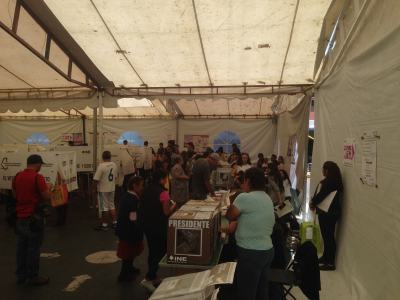
UPDATE 1:58 PM: At 1:22 pm, an observer reported: “Casilla 0481, Coyoacán. Only evident issue is small size of the local which delays vote.”
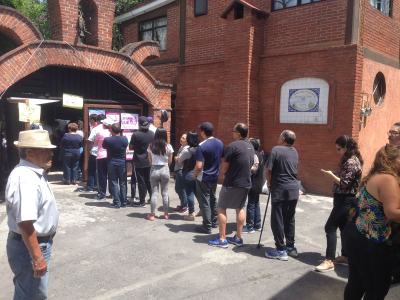
UPDATE 1:54 PM: Observers have consistently reported long lines at “special” voting centers, set up to allow people traveling outside their home district to vote. Ciro Murayama, an INE electoral counselor, tweeted that each of these centers has only 750 ballots as stipulated in the electoral law and that many would not be able to vote. Christy Thornton tweeted that at one such voting center in Jilotepec she counted around 200 people in line to vote.
UPDATE 1:47 PM: Duncan Tucker, regional media manager for Amnesty International tweets:
Jalisco’s electoral institute has ordered @AristeguiOnline to take down an article published on the eve of the elections about the leading gubernatorial candidate’s alleged links to organised crime. This illustrates the tensions that affect press freedom in Mexico.
— Duncan Tucker (@DuncanTucker) July 1, 2018
UPDATE 1:20 PM: INE president Lorenzo Córdova recently made a statement, declaring the electoral process was occurring in a situation of calm and without major incidents. He said that, of the 156,807 casillas, only 4 were not installed. Observers, however, have reported that a large number of casillas did not open on time.
UPDATE 1:14 PM: An observer reports: “A somewhat chaotic voting center in San Isidro Buensuceso (neighborhood), San Pablo del Monte (municipio), sección 363, Tlaxcala. Casillas are close together. We saw a ‘halcón’ ? a boy up on the balcony to watch the votes happening below [which is illegal]. People watching/monitoring voters (no lists). No security. The INE told us that the municipal government refused to provide security or lunch, citing the veda electoral [the pre-election day period in which campaigning and politicking is banned, as is dissemination of government messages].”
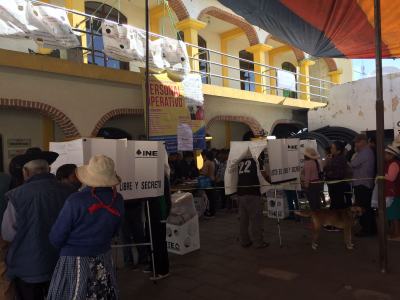
UPDATE 1:03 PM: More reports are coming in of how widespread the late opening of polling places has been today. A observer tells us, “Here in Districto 1 of Jilotepec, only 11 of 116 casillas were open at 9:20 am.” José Roberto Ruiz, an electoral advisor to the INE, Tweeted earlier today:
De 156,808 Casillas aprobadas, a las 8:36 am ya son 2,725 instaladas en el país. ¡Hay Jornada Electoral!
— José Roberto Ruiz (@Jose_Roberto77) July 1, 2018
UPDATE 12:54 PM: Journalist Jeff Abbott Tweeted to us:
Many polling stations in San Cristobal de las Casas opened at least 45 minutes late. INE representatives were still setting up polling booths when I passed through a couple at 8:30/8:45am
— Jeff Abbott (@palabrasdeabajo) July 1, 2018
UPDATE 12:49 PM: An RUCD brigade that includes Father Miguel Concha, director of the Vitoria Center; Laura Carlsen, director of the Americas Program at the Center for International Policy; Father Alejandro Solalinde; and law professor John Ackerman of the Instituto de Investigaciones Juridicas at UNAM is beginning their voting observations in Ecatepec, Mexico State, where they will visit 11 casillas. They recorded this message earlier (and are planning to livestream here).
Also in Ecatepec, an observer reports: “A lot of problems in Ecatepec. We already saw two ‘casas amigas’, intimidations, etc.” Latin American studies professor Christy Thornton, who is also observing the elections today, has previously described a casa amiga as a place “where [party] operatives coordinate various kinds of voter coercion, from outright buying of votes to incentivizing individuals to bring five or ten others with them to the polls.”
UPDATE 12:45 PM: Local media have reported that a 45 year old woman was shot and killed while she waited to vote this morning in Cárdenas, Tabasco.
UPDATE 12:42 PM: Christy Thornton points out that false information has been circulating for months on social networks and today is no different; it is “meant to confuse and intimidate voters.” A message has been circulating on WhatsApp today purporting to come from the president of a voting center saying the markers used are being erased. The message is false.
UPDATE 12:00 PM: At 11:45 AM, an election observer reported: “At casilla 0740 [in Coyoacán], two young women without INE accreditation were polling voters. But when we asked the president [of the casilla], he asked the police officer to investigate, and they produced this document.”
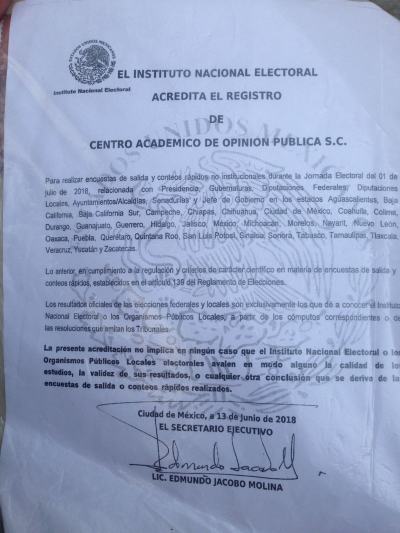
UPDATE 11:21 AM: The Scholar and Citizen Network for Democracy tweets:
Armed individuals stole election materials and ballots in the Iztapalapa borough of Mexico City.
— @MexicoDemocracy July 1, 2018
UPDATE 11:13 AM: Electoral officials are pushing back against criticism that the election is disorganized, manifest in the late opening of so many polling places. INE spokespersons are saying that everyone in line before polling places close will be able to vote.
UPDATE 11:01 AM: Here is the ballot that voters will use today to mark their choice for president. (courtesy of @Andalalucha).
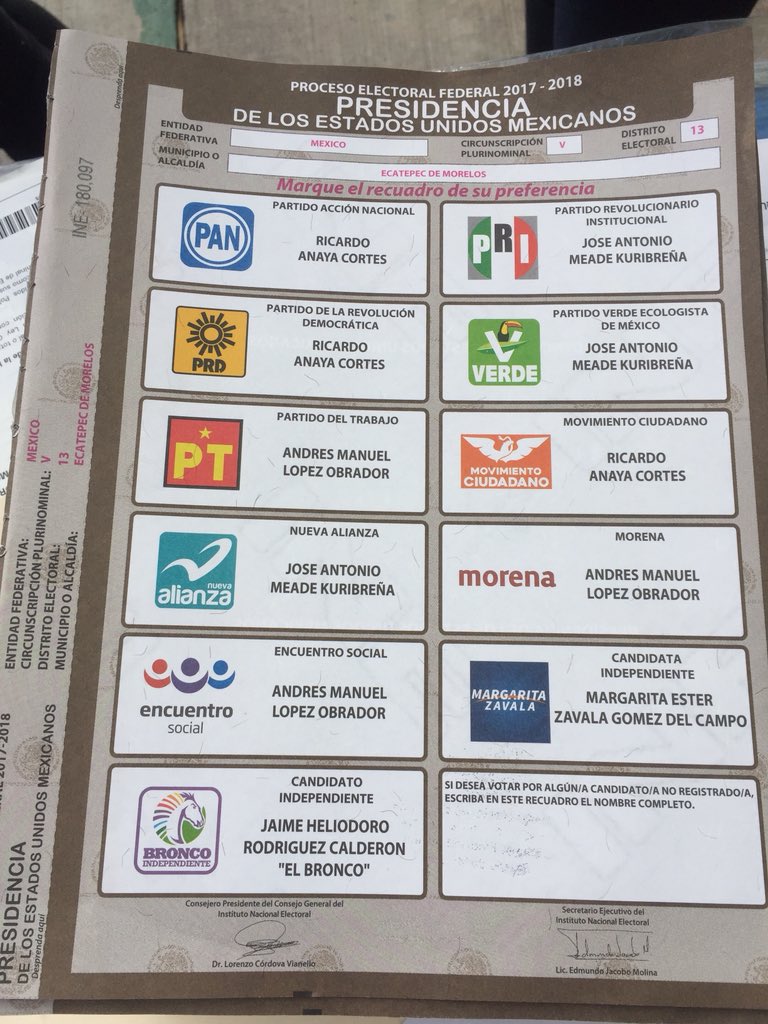
UPDATE 10:56 AM: The New York Timesreports on the impact of electoral violence on local races, especially in more rural areas:
In the long run-up to the vote, much of the national and international focus has been on the presidential contest. Yet for the millions of people living in the most violent parts of the country, elections for local office may have the biggest impact on their daily lives.
And organized crime groups have all but decided many of those outcomes already.
“No one has been more active during these campaigns” than these criminal groups, said Alejandro Martínez, a top official for the center-right National Action Party in Guerrero, one of the poorest and most violent states in Mexico.
Scores, if not hundreds, have abandoned their candidacies out of fear for their lives. Some parties have not been able to field nominees willing to contest certain posts.
Some candidates have been forced to travel in armored cars flanked by bodyguards and to wear body armor in public. In parts of the most violent states, threats have made campaigning impossible.
“You have to be a little crazy to run for office here,” Mr. Martínez said.
Collusion between politicians and criminal organizations in Mexico is not new. But over the past decade, criminals have increasingly sought to co-opt local politics by trying to influence the electoral process, using violence to effectively handpick slates of candidates.
UPDATE 10:51 AM: The permanent session of the INE, where electoral counselors and political party representatives are present, can be viewed live here. Lorenzo Cordova, president of the INE, stated that there is “no room for fraud” in the elections. Political party representatives don’t seem to agree, however.
UPDATE 10:45 AM: Diálogos por la Democracia at UNAM is urging people to report voting irregularities or fraud that they witness today:

UPDATE 10:35 AM: An observer reported, at 10:26, a long line of 100 waiting in Ixtapan de la Sal to vote in a Casilla Especial. “These Special Precincts allow for casting the US equivalent of provisional ballots. These are used for people who are outside of their voting precincts, in this case many are visiting from nearby Mexico City. There are only 750 ballots in total, which at the current rate will last only until around noon.”
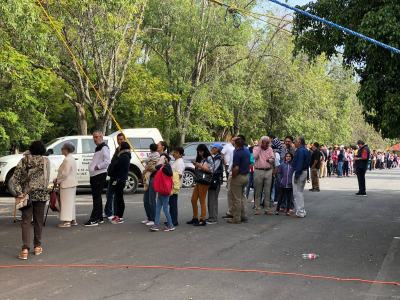
UPDATE 10:29 AM: Aristegui Noticias reports on electoral violence and attempted vote buying in Chiapas. In Mapastepec, two individuals were detained with envelopes of pesos and lists of intended recipients. In Venustiano Carranza a group of armed people reportedly attempted to steal electoral materials. And the Network of Electoral Observers of Chiapas denounced the intensification of attempts by party and government officials to coerce voters over the last few days, including though conditioning federal and state programs on how individuals voted. Full article here.
UPDATE 10:25 AM: At 9:20, journalist Martha Pskowski Tweeted:
At least a hundred people are waiting to enter the polling place here in San Cristobal Centro, Ecatepec. #EleccionesMexico pic.twitter.com/xX5hOs1MIB
— martha pskowski (@psskow) July 1, 2018
She reported at 10:20: “It’s open! Over 200 people were in line by the time it opened.”
UPDATE 10:20 AM: Observers reported voting finally started to begin 53 minutes late at Ixtapan de la Sal, and Coyoacán 0729 (Mexico City), respectively:
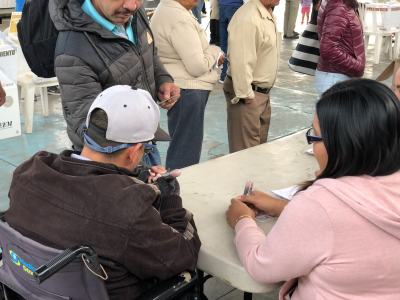
Ixtapan de la Sal: 8:53, first votes cast. Indelible ink applied to finger to prevent “Chicago style” multiple voting.
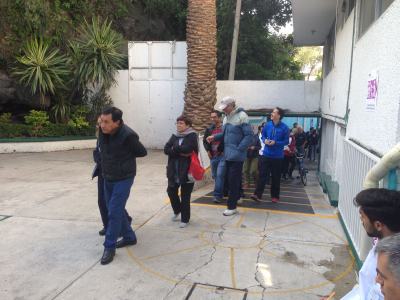
8:53 am: voters entering Coyoacan 0729, election here underway.
UPDATE 10:09 AM: At 9:50 ET, an observer reported: “Voters losing patience with election officials who have not yet opened the polls here in Jilotepec. Some of the polling places are missing the officials who will tally the votes, and they cannot open without them.”
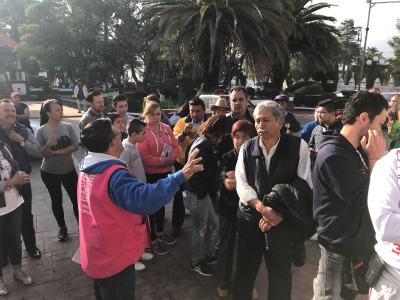
UPDATE 10:04 AM:
Here in the rural zones of the Estado de México, the citizens who are chosen as electoral volunteers frequently can’t miss a whole day of work, in the fields or factories, in order to sit at the polls.
— Christy Thornton (@llchristyll) July 1, 2018
There’s a report of more than 15 people in a casilla in Ecatepec, going over the electors list, listening and observing to check who is voting. They are reportedly not all accredited as party or INE representatives, so this is illegal.
UPDATE 9:55 AM: Reports are coming in from various areas of polling stations opening late. In many districts across the Estado de México (Mexico State), polls were still being set up at 8:30, a half hour after they are supposed to open. Party representatives were still being accredited and ballot boxes assembled, while voters began to assemble and ask the electoral officials when they can vote. In Ixtapan de la Sal (in Mexico State, just outside Mexico City) the lista was being reviewed and blank ballots counted, and voting still had not started at 8:45am.
At 8:45, Coyoacán 377 in Mexico City was just starting to open. Voters are protesting the late start at Coyoacan 729. In Coyoacán 0377, CDMX, similarly. the polls still had not opened by 8:30 am. None of the parties have representation because the list given to the presidenta was out of date, and the party representatives did not appear on the list, so they will need to get an updated list from the INE (electoral authority), but that means the poll will not be watched for several hours, at least.
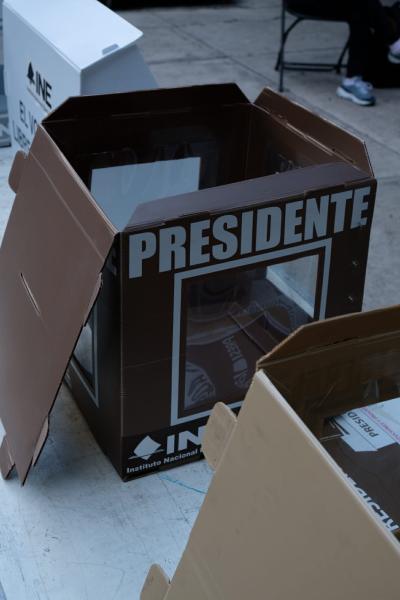
Caja awaiting ballots, Coyoacán
UPDATE 9:43 AM:La Jornada reports on violence impacting the electoral process in Michoacan state. Three were killed on Friday night in a conflict between PRI and PRD activists. Also, the INE has opted to not set up 12 ballot boxes in Nahuatzen after some 3,000 ballots were burned. Reuters has more on the specifics of the conflict in Nahuatzen, where indigenous communities have rejected the electoral process:
Nahuatzen is part of a growing movement among Mexico’s indigenous communities, who are seeking self-rule and turning their backs on mainstream elections. Dissent in Michoacan ignited seven years ago, ahead of the 2012 presidential election, when just one jurisdiction, the municipality of Cheran, opted out of voting.
This year, the boycott spread to six additional municipalities affecting dozens of polling stations across the 16 towns, home to at least 50,000 voters.
UPDATE 9:29 AM: Photos of preparation for the vote. Here, journalists in Mexico City await AMLO’s arrival to cast his vote.
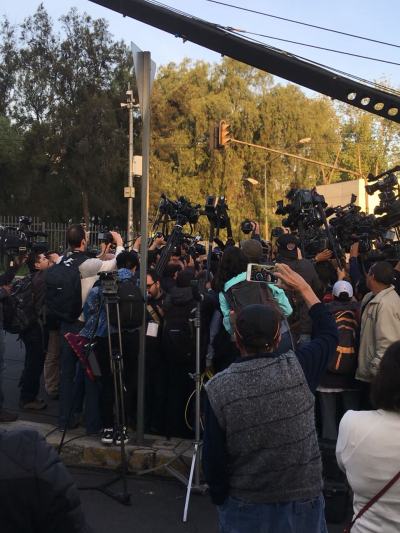
Setting up the casilla in Tlaxcala:
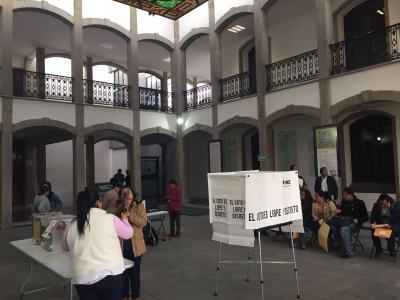
Line for a casilla in the Coyoacán district of Mexico City:
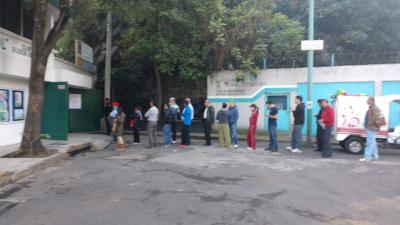
UPDATE 9:10 AM: Polls are meant to open at 8am local time and observers have reported lines forming outside many voting centers. And so begins a historic election day throughout Mexico. Exit polls are expected around 8pm with official results coming hours later.
UPDATE 8:30 AM: La Jornada reports this morning that four PRD activists were killed and four more were wounded yesterday in the State of Mexico after discovering activists affiliated with the PRI handing out food to potential voters.
UPDATE 8:15 AM: Already, at 6am, the RUCD team in Jardines de Morelos, Ecatepec, reports that they arrived to find no microbus service running. They went to the base for the buses, and for more than 50 busses assembled. A team member asked a driver there, and she was told there was no service because all were going “to the INE” – the electoral authority. As these busses have no reason to go to the offices of the electoral authority, it was clear that the driver meant they were assembled to transport voters. This is an illegal but quite common process called ‘acarreo,’ where parties arrange to bring voters to the polls in groups – a violation of electoral law.
————–
Welcome to our live blog on Mexico’s 2018 national elections. Throughout the day, we will be bringing you on-the-ground reports from international observers deployed in different parts of the country, as well as sharing updates from Mexican and international media outlets, and from social media sources with a record for reliable and accurate information. This blog will be updated frequently during and immediately following the July 1 elections, so be sure to check back regularly.
On July 1, Mexicans voters will be electing federal, state, and local officials to over 3,400 positions, including a new president, legislators in both houses of Congress, and thousands of local and state officials. The most recent polls suggest that outsider candidate Andrés Manuel López Obrador ? of the left-of-center Morena party ? will likely win the presidential election by a wide margin. For the first time in nearly 90 years, a political party other than the centrist PRI (which had uninterrupted control of the presidency until 2000) or the conservative PAN (which held the presidency from 2000 to 2012) could end up controlling the presidency, and some polls predict that Morena will win a majority of seats in the legislature as well.
However, as in past Mexican elections, various forms of fraud, vote-buying, and voter intimidation and coercion are widely expected to take place. Incidents of vote-buying and voter coercion have already been reported. In addition, the election campaign has been marred by high levels of violence, including the killing of over 130 politicians and candidates, the highest number on record for a campaign in Mexico. There are fears that violent incidents could take place during these elections.
This live blog of the elections will include updates from some of the more than 100 accredited international observers from the Scholars’ and Citizens’ Network for Democracy (RUCD, by its Spanish initials), a project of the Fray Francisco de Vitoria Human Rights Center and the Dialogues for Democracy program at Mexico’s National Autonomous University (UNAM, by its Spanish initials). These observers, who will be accompanied by Mexican counterparts from the RUCD, will be visiting hundreds of voting centers in six Mexican states, including Morelos, Puebla, Mexico State, Chiapas, Veracruz, and Tlaxcala, as well as in Mexico City.
We will also share excerpts and links from news outlets and social media tracking developments surrounding the elections. Given the abundance of false or unsubstantiated information that has circulated during the electoral season ? as Verificado 2018 and other fact-checkers have documented ? we will focus on sources that have a strong record for accurate reporting.
We at CEPR have monitored Mexican elections in the past, notably in 2006, when we conducted an independent review of information made available from 2,534 ballot boxes and found a number of problems with the ballot count. CEPR also concluded that half of the ballot boxes in that election had “adding up” errors, that is, the total number of blank ballots received at the ballot box location before the vote did not equal the total number of votes recorded (including null votes) plus the blank ballots left over. CEPR has previously live blogged several elections in Haiti, Honduras, and Venezuela.
A Brief Introduction to Mexico’s 2018 Elections
On July 1, Mexicans will go to the polls to elect candidates to over 3,400 positions, including a new president, both houses of Congress, nine governors and thousands of other local and state officials. The elections take place as Mexico struggles with a generally stagnant economy and a series of scandals that have shaken public faith not just in the current administration, but in many of Mexico’s institutions. These include reports of state security involvement in the disappearance of 43 young people studying to be teachers in Ayotzinapa, personal enrichment scandals surrounding President Enrique Peña Nieto and his family, and the legacy of a militarized war on drugs and crime begun under former president Felipe Calderon that corresponded with a period of soaring homicide numbers and thousands of disappearances. The murder rate hit a record high in 2017.
As a result of these and other factors, the popularity rating of outgoing president Enrique Peña Nieto, of the PRI party, has sunk to 23 percent, according to recent polls.
The presidential candidates are:
Andrés Manuel López Obrador (frequently known as AMLO)
“Together We Will Make History” (Juntos Haremos Historia) Coalition, made up of the National Regeneration Movement (MORENA), Labor Party (PT), and Social Encounter Party (PES).
This is López Obrador’s third time running for president, though the first with the Morena party, which started as a movement supporting his candidacy in 2012 and officially became a party in 2014. López Obrador, the former mayor of Mexico City (2000–2005), has campaigned on ending rampant corruption and focusing on boosting the domestic economy, including the agricultural sector. While there is some concern from the business community and internationally regarding what López Obrador would do about NAFTA or the 2013 energy reform, he has stated that, if elected, he would work with the US, and that he would not revoke the energy reform, though he would review existing contracts for corruption.
Ricardo Anaya
“The Forward Front for Mexico” (“Por México Al Frente”) Coalition, made up of the right-wing National Action Party (PAN), the left-wing Party of the Democratic Revolution (PRD), and the left-wing Citizens’ Movement (MC).
Polling (a distant) second behind AMLO, Anaya has presented himself as a youthful (he’s 39) fresh face, promoting a vision of transitioning from manufacturing to a tech-focused economy, while curbing crime and corruption. Anaya is a former legislator who presents himself as a would-be departure from previous presidents, and he was able to secure the unusual backing of both the right-wing PAN, and the left-wing PRD and MC. Anaya nonetheless is the current PAN president, has been a party functionary for several years, and has been a member of the party for his entire political career. He has also been criticized by some within his own party for divisive actions he has taken, and has been dogged by corruption allegations of his own.
José Antonio Meade
Everyone for Mexico (“Todos por México”) coalition, made up of the Institutional Revolutionary Party (PRI), New Alliance (PANAL), and the Ecologist Green Party of Mexico (PVEM).
Although he is the candidate of the ruling PRI, Meade wasn’t a member of the party until recently. Though the PRI’s strategy appears to be an effort to run the little-known Meade as an “outsider” candidate, he is still trailing in third place. Meade may in fact be the consummate “insider-outsider”: he is a former cabinet secretary (energy, foreign relations, social development, and then finance and public credit) with degrees in law and economics from UNAM and Yale, respectively.
Jaime “El Bronco” Rodríguez
Independent candidate
This is the first year that independent candidates can run for president. Rodríguez, better known as “El Bronco,” has focused much of his campaign on that he is not affiliated with a party, the solution he says Mexico needs (although he may also be remembered for his debate response when he said he would solve corruption by cutting off thieves’ hands).
Margarita Zavala, a lawyer and politician, and the wife of former President Felipe Calderón of the PAN party, was also running as an independent candidate, before she withdrew in May (though her name still appears on the ballots, which were printed before her announcement).
The story so far:
Polls have consistently had López Obrador in the lead throughout the campaign; at this point over 20 points ahead, according to the majority of pollsters. His election would represent a historic shift for Mexico. The PRI led Mexico uninterrupted for 71 years, before PAN governments took over in 2000 and again in 2006. When Enrique Peña Nieto of the PRI took office in 2012, he signed the “Pact for Mexico,” along with the heads of the PRI, PAN, and PRD parties. This pact promised, in part, a new era of economic growth and prosperity, which did not materialize. It did, however, consolidate the idea for many of the PRI, PAN, and PRD working in alliance, which may have damaged the standing of all three parties given the unpopularity of the current PRI administration. The traditionally left-leaning PRD eventually left the Pact, though it is in coalition with the center-right PAN in the 2018 elections. If elected, López Obrador, with the Morena party and the “Together We Will Make History” coalition, would therefore represent a significant departure from Mexico’s political history thus far.
Voting Day:
Voting centers will be open from 8:00 am to 6:00 pm (or until all those in line to vote before 6 pm have voted). At 11 pm, the National Voting Institute (INE, by its Spanish initials) will release its initial projections of results based on a broad sample of centers with confirmed voting tallies. Between 8 pm on July 1 and 8 am on July 2, the results tallied in each voting center are electronically transmitted to the INE headquarters in Mexico City. In theory, the preliminary (PREP) results could be processed and made public by late evening on July 1, but past experience suggests that the results may not be publicly released until the early morning of July 2.





